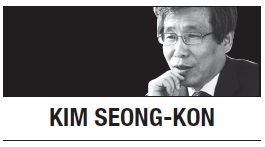 Although it still lurks in the guise of socialism, communism has completely failed and therefore has largely disappeared from the face of the earth. The same is true of the Cold War ideology.
Although it still lurks in the guise of socialism, communism has completely failed and therefore has largely disappeared from the face of the earth. The same is true of the Cold War ideology. Strangely, however, only on the Korean Peninsula do we see the paradigms of communism and the Cold War mentality still at play.
To our dismay, both capitalism and democracy, too, seem to have exhausted their possibilities these days. Capitalism, pushed to the extreme, created a Wall Street where money rules and fund managers can make a fortune instantly by simply toying with figures. To Wall Street people, money is nothing but a string of digits traveling online and there is simply no space for profound insight or moral ethics in their notion of money.
To make matters worse, capitalism inevitably created a worldwide phenomenon: The rich become richer and the poor become poorer. Unless you were born with a silver spoon in your mouth, you are not likely to become rich, no matter how hard you try.
Democracy, too, seems to face a dead end, as it has defied social hierarchy and instigated populism in many countries. People misunderstand that democracy simply means abiding by the decision of the majority, a belief which can easily degenerate into the “despotism of the masses.”
In fact, democracy also means respecting minority opinions. However, in many nations these days, people confuse democracy with populism. The problem is that populism can dismantle a country both financially and intellectually until it is bankrupt.
Unfortunately, however, politicians use sugarcoated populist policies as bait in order to win elections. They entice sweet-toothed people who do not realize that the inevitable outcome of their sweet tooth is a cavity. In his novel, “Consent to Kill,” Vince Flynn points out that if populist politicians lure people with free social welfare to win an election and people elect them, their country is doomed to become bankrupt.
Taking a European nation as an example, Flynn argues that even a once-mighty nation will fall when populist political leaders allow 35 working hours per week, two-hour lunches, and nine weeks of vacation every year. Vince warns that socialism undermines a country much more silently than communism.
In a society where democracy means populism, people also tend to think they are in charge of their nation, rather than the politicians they have elected. Oftentimes, however, people’s spontaneous, collective judgment is not trustworthy and prone to mistakes. There are times when they should let their elected politicians do their job on their behalf.
Otherwise, what are elections for? Yet people think even elected politicians should ask for their permission before they attempt to do anything. Since people believe in people power and not politicians, they resort to street demonstrations and strikes whenever issues crop up. Moreover, people may think that everybody should be equal in wealth and social status, rather than before God.
Naturally, people resent those who are richer and more privileged than them. They no longer respect their superiors or honor the privileges their positions entail. Under the circumstances, society will become chaotic and political situations volatile.
If that is the case, perhaps we need a third way. The third way means transcending the either/or mentality and binary oppositions. The third way means crossing boundaries and embracing the both/and frame of mind. The third way means finding another space between ones and zeroes, acknowledging the middle ground and avoiding both extremes. The third way means mediating two mutually antagonizing extremes and exploring another way that can overcome the problems of the two.
In order to present the third way, therefore, perhaps we should consolidate capitalism and socialism to a certain extent, taking the merits they have, and modify democracy so it can be based on mature citizenship, not on populism or a distorted sense of equality.
Likewise, in the political arena, we can also put an end to the chronic disease of factional skirmishes by merging conservatism and liberalism. There are times when even a conservative can become a liberal and vice versa depending on the situation. There are neither eternal conservatives nor perpetual liberals.
In “Vineland,” Thomas reprimands our black and white mentality, lamenting, “If patterns of ones and zeroes were ‘like’ patterns of human lives and deaths, if everything about an individual could be represented in a computer record by a long string of ones and zeroes, then what kind of creature could be represented by a long string of lives and deaths?”
Our lives are much more sophisticated and complex than a black-and-white photo. We do not need to choose between life and death, left and right, or liberalism and conservatism. The world is not made of binary oppositions such as Christianity and Islam or East and West. In Istanbul, you can find both Christian cathedrals and Islamic mosques, Europe and Asia. This is the case in Spain as well.
Caught in the crossfire between two extremes, there is an urgent need to find a third way, a new realm of our consciousness. There must be a third way between ones and zeroes.
By Kim Seong-kon
Kim Seong-kon is a professor emeritus of English at Seoul National University and president of the Literature Translation Institute of Korea. He can be reached at sukim@snu.ac.kr. -- Ed.
-
Articles by Korea Herald





![[K-pop’s dilemma] Can K-pop break free from ‘fandom’ model?](http://res.heraldm.com/phpwas/restmb_idxmake.php?idx=644&simg=/content/image/2024/05/09/20240509050541_0.jpg&u=20240509173751)




![[News Analysis] Yoon's first 2 years marked by intense confrontations, lack of leadership](http://res.heraldm.com/phpwas/restmb_idxmake.php?idx=644&simg=/content/image/2024/05/09/20240509050612_0.jpg&u=20240509233252)








![[Today’s K-pop] NCT’s Mark to drop 1st solo album in February 2025](http://res.heraldm.com/phpwas/restmb_idxmake.php?idx=642&simg=/content/image/2024/05/10/20240510050597_0.jpg&u=)